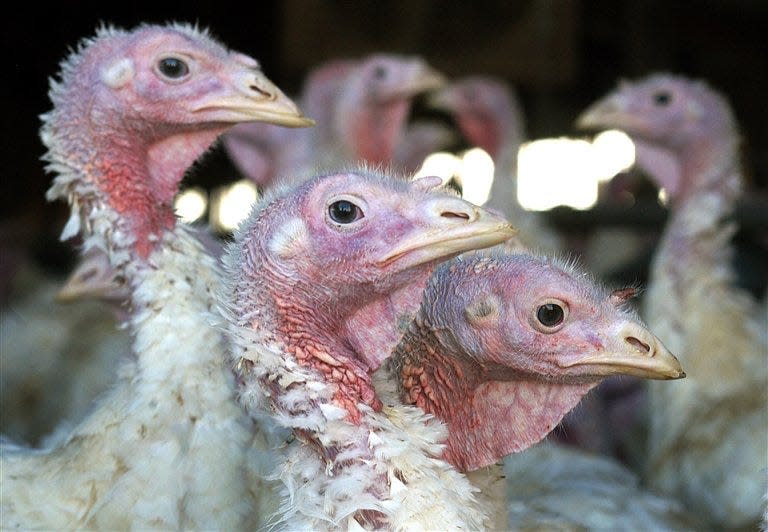Opinion: Avian flu isn't something just for the birds. It reveals agriculture's ills.
- Oops!Something went wrong.Please try again later.
COVID-19 has infected more than 500 million people around the globe, and other transmissible zoonotic diseases are also spreading, but largely out of public view. Behind the doors of America’s factory farms, 37 million birds have been killed as a result of a bird flu outbreak in the United States. The transmission of the disease to a prison inmate in Colorado in April who was working at a factory farm reminds us that our lives are inextricably linked to the lives of other animals. We all share the same earth and air, and we face similar threats to our health and wellbeing, whether in the form of ecological catastrophe like the climate crisis, the loss of biodiversity, or transmissible and often deadly biological diseases.
The current COVID pandemic and bird flu outbreaks should serve as a wakeup call. While our exploitation of animals is unethical, it can also threaten our survival. Humans have always been susceptible to animal-borne diseases, whether during the plague in the Middle Ages or the pandemic of 1918 that killed 50 million people. Our mass production of animals in factory farms has exacerbated the risk. The novel strain of the 2009 swine flu that infected around 60 million U.S. citizens likely emerged on an industrial pig operation, and the Centers for Disease Control and Prevention warns that "3 out of every 4 new or emerging infectious diseases in people come from animals.”
More: Iowa wildlife officials assessing bird flu's impact on eagles, hawks, other wild birds
Factory farms pack animals in filthy and stressful conditions that, when combined with irresponsible overuse of drugs, contribute to the development and spread of new and more virulent pathogens. Workers also suffer under the oppressive hand of industrial agriculture. This was made clear during the COVID pandemic when large numbers of slaughterhouse workers were infected, causing slaughterhouse closures and supply chain backups that led to the extermination and disposal of millions of farm animals. A common way to “depopulate” and kill these poor chickens and pigs is through ventilation shutdown, or VSD+, where the temperature is heated up in factory farm warehouses and animals die excruciatingly cruel deaths, suffocating over the course of hours. This was a common method used when slaughterhouses were closed because of COVID, and it’s being used all over the country now as bird flu sweeps through factory farms.
While the industry should be scrambling to prevent bird flu from ravaging the billions of chickens and turkeys exploited by America’s poultry industry, they are incentivized to wait until their flocks are infected and then kill them in horrific ways including VSD+, smothering them with fire-fighting foam, or gassing them to death. During the last major bird flu outbreak, which occurred only seven years ago, the entire response effort cost taxpayers roughly $850 million. Rather than acting to prevent future outbreaks, the USDA supports factory farming and overcrowded conditions that are ideal for the spread of disease.

We are now facing evolving threats from COVID, bird flu, and other zoonotic diseases. There are conflicting opinions about whether COVID-19 originated in an animal laboratory or at a live animal market, but in either case, it is rooted in the ways we are living out of alignment with animals and the natural world across the globe. We see the consequences of that misalignment so clearly in industrialized agriculture here in the U.S. It’s impossible to know what transmissible diseases and variants are lurking in our midst as a result of industrialized agriculture, but the evidence is clear that when we cause harm to other animals and our shared environment, we also harm ourselves. Infectious disease experts and the World Health Organization have warned that diseases like the current strain of avian influenza that is infecting domesticated poultry in the U.S. could spawn variants that lead to a human influenza pandemic.
Government policies must be updated to restrict irresponsible agricultural practices, and in the meantime each of us can make conscientious choices every day to help make a difference. A good way to start is by leaving factory farmed products off of our plates.
Gene Baur is president and co-founder of Farm Sanctuary, America’s first farm animal sanctuary and advocacy organization. Lauri Torgerson-White is an animal welfare scientist and research director at Farm Sanctuary.
This article originally appeared on Des Moines Register: Opinion: Avian flu isn't just for birds; it reveals agriculture's ills

